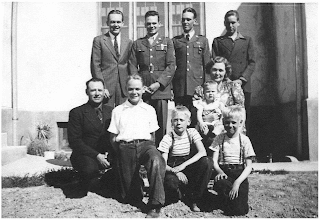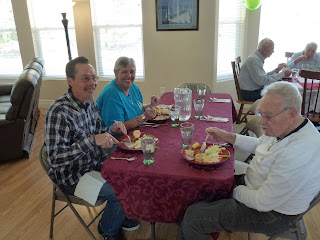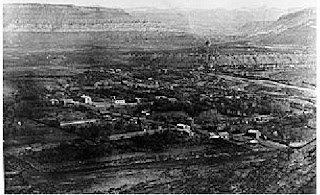CHAPTER THIRTEEN
SOME OF MY HIGHWAY PATROL EXPERIENCES
In the last chapter I told of joining the Highway patrol on July 9, 1933. In the fall of 1947 I, along with forty-two other patrolmen took a six hour civil service test for the office of lieutenant in the Patrol. It contained over a thousand questions. When the results were given, I was very proud to get the word that I had received a rate of 100% for the highest by ten per cent over the others. The lowest getting 42%. In August 1948, I was appointed as Lieutenant over the district covering Washington, Iron, Beaver, Kane, Garfield and Piute Counties. When Governor Lee was elected and took office he reduced all officers in the patrol one rank, so I became a sergeant, an office I held until I retired.
I had many exciting and interesting experiences as a Patrol Officer. Assisted in tracking down and arresting many criminals and have captured a number of armed men in possession of stolen cars. Only on one occasion was I shot at and it being an interesting case will tell this one story.
On a Tuesday night between the hours of nine and ten p.m. I was returning toward home from a routine day of patrolling the highways and had just turned off the highway US 91 at Anderson Junction onto highway U 15 when I noticed through the rear view mirror that the car that had come up behind me before reaching the junction had stopped as if in doubt of which road to take. I pulled off the shoulder of the road and stopped as I had done on many occasions before, thinking some stranger did not know which road to take. In a moment the car turned off onto the road I was on and I rather expected it to stop as it came up to me to ask information or directions. However, the car passed me up and I fell in behind it and continued on my way. As I came over the hill crest I noticed the taillights of this car far in advance of me and realized it would have to be speeding to get so far ahead of me in such a short distance. I speeded up and caught up with this car just as it entered Toquerville and checked its speed in town of 50 miles per hour. For the first and only time of twenty-five years as a Patrolman I took my gun out of the holster and lay it on the seat by my side. Something seemed to tell me that I was going to be shot at. After a check of the speed I turned on the red light and flashed it into his rear view mirror. The driver did not slow down, so I speeded up to the side of the car and turned the red spotlight in the side window and stepped upon the siren. Still he did not slow down, so I pulled a little ahead of him and started to crowd him off the road and succeeded in doing just that as we reached the south end of Toquerville. I had him crowded off the oil and onto the gravel shoulder and he started to slow down just as we came alongside the old rock building next the road. He nearly stopped, so I dropped back to approach him from the rear with my car lights upon him. Trucks had been using the wide space at the south end of this building in which to turn around and it looked like a road continued around this building. As I dropped behind the other driver stepped on the gas and whirled around the end of the building, only to find he was fenced in. He crashed into the fence before he could stop. I pulled up just so I could see his car and crawled out of my car without exposing myself and lay my gun and arm across the hood of my car and then slowly raised my head just so I could see over the hood of the car. The motor was still running in his car and a radio was on. There was about a quarter moon in the western sky that was shining in my face; but the other car was in the shade of a row of trees. After a few seconds I saw a face appear over the hood of the other car as he seemed to be staring at me for a moment. Then I said, "What are you doing there, Bud?" Another few seconds and I saw the flash of his automatic pistol as he fired at me, the bullet thudded in the bank behind me. I am sure I ducked as he had only the top of my head to shoot at. We were less than thirty feet apart. Immediately after the shot I heard the wires on the fence squeaking as if someone was crawling through. It looked like the natural thing for a person to do was to run around the building. so I ran to the north comer and peeked around the comer with my gun ready with the intent of calling for him to stop or I would fire. Then I got the thought that he might be behind me and I felt the hair stand up on the back of my neck and for the first time felt a chill of fright. I looked quickly over my shoulder and could not see nor hear anything. I ran back to my car and again cautiously looked over the hood at the other car. Just then Harvey Theobald who lived a block west of the scene, drove up in his pick-up and asked me if I was OK. He said he had heard my siren as I attempted to stop the car in town and had come out on his porch as he was sure it was me after a law violator. He saw us pass his street and then had heard the crash as the car hit the fence. Then he said all was quiet for a few moments and he heard the shot. Right after the shot he heard something come crashing down through the orchard between him and where he heard the shot. He said he feared someone had shot me so he ran to his car and started it and just as he turned his lights on, a man hit the fence with such force that it tore out the staples for several posts in either direction and caused the man to flip head over heels over the fence and into the ditch of water. He watched him climb out of the ditch cross the street and through the other fence and continued running down through the orchard. In just a few minutes twenty or thirty people had assembled from the neighborhood. Some wanted to pursue the man, but I told them we would have to use extreme caution as this man was armed and could lie in wait behind any bush or tree in the darkness and shoot anyone easily.
I went to a neighbor's house and phoned Sheriff Antone Prince and Trooper Porter who were there in record time. We set up roadblocks on all roads in that area and from then until after the moon went down scouted the area for any trace of the man. After that, we drove around the loop from Anderson Junction to Hurricane, west to 91 and back to Anderson Junction in hopes this man may come out of hiding and attempt to hitch a ride. We also kept checks with the men on the road blocks. At daylight we had many volunteers some on horses and some on foot and searched the area all day without a trace of the man except near the scene of the shooting we found his footprints that showed a bell in the heels of his shoes. We also found the ejected 32 shell from the automatic pistol that had been fired at me.
The morning after the shooting event I called my headquarters and gave them the information and description of the car, etc., asking them to notify the F.B.I. The morning of the second day saw 13 F.B.I. officers on the scene. A man reported that during the night he had seen what appeared to be a light from a flash light off to the west of the highway about a mile north of Leeds. Upon investigation of that area we found the shoe tracks with the bell in the heels. That day was spent searching the hills west of Leeds. Friday morning about one o'clock a chicken farmer north and west of St. George went to investigate the barking of his dogs and saw a man walking north on the road that leads to Enterprise and thinking that it may be someone who had run out of gas, called to him upon which the man took off on a run into the brush. This rancher called the Sheriff, who called other local help and went to the place where the man was seen to leave the road and where they found again the bell imprint in the heels. Some miles north, his flashlight was again seen as he climbed a lava ridge.
All day Friday and Saturday the hunt went on. The men on the road blocks had not seen anyone suspicious. We were sure the man was still in the area as we searched the west and south side of Pine Valley Mountain. Many of these F.B.I. agents had only worked in cities and were somewhat at a loss in the rough mountain areas. We divided up with one local man with two agents in our search. On Sunday morning two agents and Deputy Sheriff Carl Caldwell were in the mountains northwest of Leeds and had found the track with the bell heels. Tracking was very difficult in the brush and rock and a slow process. About one-thirty in the afternoon they approached Quail or Leeds creek and being very thirsty decided to go to the creek for a drink. As they were within a few feet of the creek a man was seen climbing out over the bank of the creek. The running of the water had prevented him from hearing the approach of the officers. The valley the creek was in had a heavy growth of Box Elder and Birch trees with trails through. They called to the man who had not seen them until then, to put up his hands and give up. Instead he reached into his shoulder holster and drew a gun and fired twice at the agents. At the first shot the agents fell flat on their faces; but the Dept. stepped behind a fallen tree. The agents fired twice at him. Both his and the slugs from their guns were later found in the trees. The man had jumped back into the creek after firing his shots and waded down the stream toward the agents. A few steps down he raised his head with the gun in readiness to fire and peered over the bank. The Dept. saw his head appear and fired with his rifle hitting the bank in front of him and showering him with dirt. The bank rose four or five feet from the stream. The bandit had ducked back into the stream and waded down another couple of steps and again raised his head looking for the officers. He did not know that the Dept. had stepped around behind the fallen tree so did not see him as he tried to get another shot at the officers. This time the Dept. not more than ten feet from him fired and the bullet struck the bandit near the temple killing him instantly and knocking him back into the creek. He was pulled out of the water onto the bank. The deputy went for a car and the body was taken to St. George and later buried in St. George. A search of his body brought forth a second loaded gun in a shoulder holster under the other arm. He was wearing a homemade vest with many pockets in which were burglar tools, candy bars, fishing line and hooks etc. Also around his waist was a money belt in which was two thousand dollars in currency. There was no identification of any kind on his person. From fingerprints he was later identified as Joe Lewis of New Jersey who had escaped from the Texas State Prison the January before, where he was serving a fifteen year sentence. He had also escaped from the Ohio State Prison before being sent to the Texas Prison. He also had a long prison record in several states. He was forty-four years old.
Upon the search of the car after he had shot at me I found two canvas bags, each packed with canned tuna, crackers, candy bars, and a loaded pistol. He never had time to take either. There was also a loaded revolver in the glove compartment. In the back seat was a shoe box with one hundred and eighty dollars in silver, in ones, halves and quarters. He had evidently broken into some clothing store as there was several new suits with the tags still on them, extra coats, several pairs of shoes and fifty pair of socks as well as other clothing. All this I turned over to the F.B.I. The car proved to have been stolen five days before in John Day, Oregon where a bank had been held up that day. This proved to be the man who had held up the bank. The Oregon plates were under the rear seat and the plates on the car had been stolen a few days before from a police car in Northern Nevada.
Space and time will not permit me to relate other experiences.


 During 1940 we built our new home and moved into it in November. DeLance only got to spend a night or two in it before leaving for his mission to the Eastern States where he spent the next two years in New York and Pennsylvania.
During 1940 we built our new home and moved into it in November. DeLance only got to spend a night or two in it before leaving for his mission to the Eastern States where he spent the next two years in New York and Pennsylvania. 


 Time does not wait for anyone and the years have sped by until now 1960 is drawing to a close. I want to write a chapter of the family activities and then hope to have this published for Christmas 1960.
Time does not wait for anyone and the years have sped by until now 1960 is drawing to a close. I want to write a chapter of the family activities and then hope to have this published for Christmas 1960.
























 Amelia had set Oct. 22nd as our wedding date so plans were made accordingly. As I was only twenty years old I had to have my mother go to the courthouse in Manti and swear out an affidavit giving her consent to my marriage. A few days before the wedding I arrived in Dixie. On the night of the twenty-first there was a bustle about the Sanders home preparing temple clothes for the occasion. When all was in readiness about eleven o'clock that night word came that due to the first and much feared epidemic of flu hitting the country the temple in St. George was closed and would not be reopened until the epidemic was over or under control.
Amelia had set Oct. 22nd as our wedding date so plans were made accordingly. As I was only twenty years old I had to have my mother go to the courthouse in Manti and swear out an affidavit giving her consent to my marriage. A few days before the wedding I arrived in Dixie. On the night of the twenty-first there was a bustle about the Sanders home preparing temple clothes for the occasion. When all was in readiness about eleven o'clock that night word came that due to the first and much feared epidemic of flu hitting the country the temple in St. George was closed and would not be reopened until the epidemic was over or under control. 



